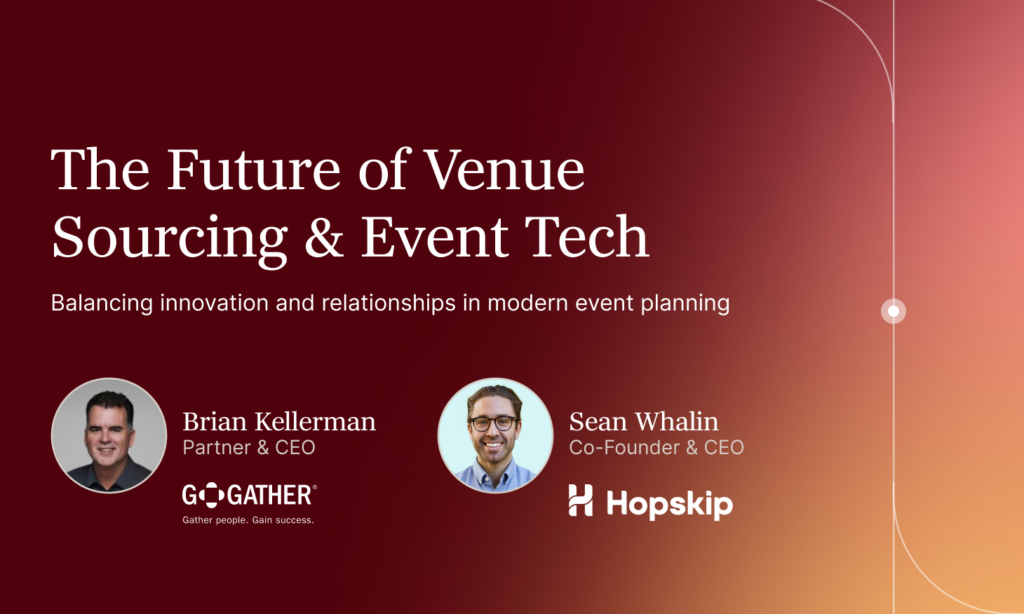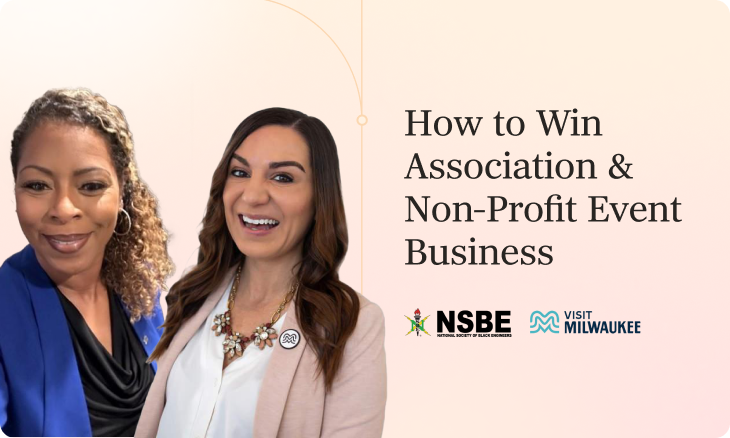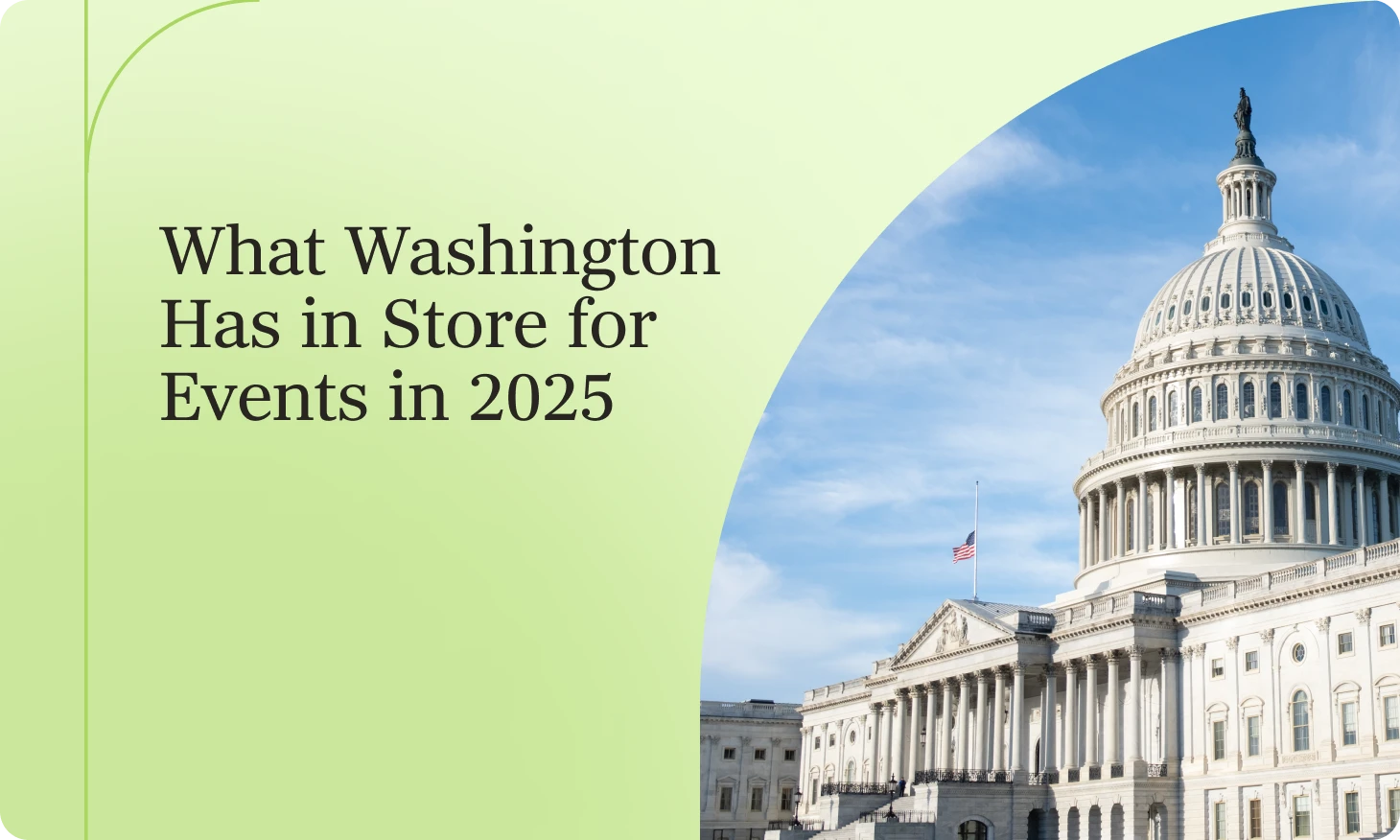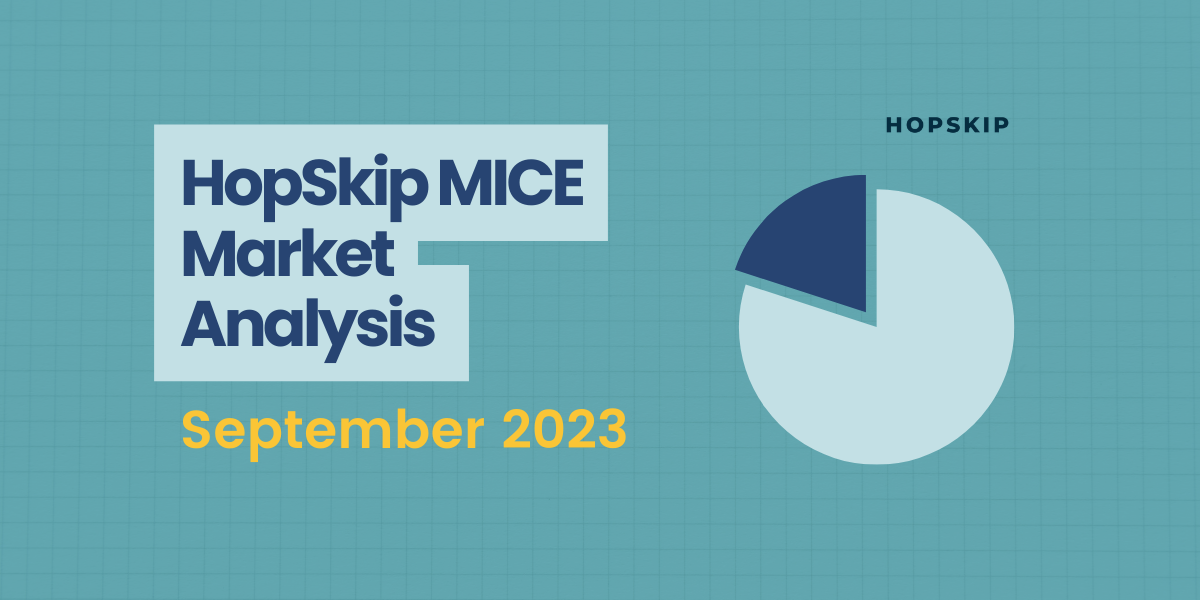
Do you ever feel like finding the perfect hotel for your next business event is like searching for a needle in a haystack? You’re not alone.
Recently, GoGather CEO Brian Kellerman chatted with Sean Whalin, CEO and co-founder of Hopskip, about how venue sourcing is evolving. Whether you’re a planner, hotel, or sales affiliate, their conversation offers valuable insights for navigating sourcing hotels and venues for events.
Watch the full recording here. Or, read the recap below.

The Headaches of Sourcing Hotels for Business Events
Let’s be honest – finding and booking the right venue can be a real pain. Many planners face these challenges daily:
- The Scattered Information Problem: There is no single source of truth for venue information. We’re all piecing together options from different sources, relying on what we’ve learned over the years.
- Proposal Format Chaos: Why does every hotel chain use a completely different template? Comparing options feels like trying to match apples to oranges.
- Spreadsheet Overload: Raise your hand if you’ve spent hours copy-pasting data from proposals into spreadsheets to make sense of your options. (We see you!)
- The Client Presentation Scramble: Transforming all that raw data into something presentable for clients or executives? That’s a whole other challenge.
“I think we’ve all been there,” notes Kellerman. “Explaining to stakeholders why one property costs more than another when the proposals look completely different is incredibly frustrating.”
Strategic Contract Negotiation in the Hotel Selection Process
The discussion offered valuable insights for both planners and suppliers on approaching the negotiation phase more strategically:
For Event Planners:
- Strategic Shortlisting: After reviewing initial proposals, narrow options to 3-5 properties before investing time in detailed negotiations
- Proactive Contract Requirements: Include specific contract language requirements upfront in RFPs to set clear expectations early
- Risk Assessment Focus: Pay particular attention to attrition, cancellation terms, and hidden fees that could significantly impact the budget
- Complete Cost Visibility: Request fully itemized breakdowns of all charges, including taxes, service fees, and mandatory surcharges
For Hotels and Venues:
- Transparency Builds Trust: Properties that provide comprehensive cost breakdowns upfront establish greater credibility
- Responsiveness Matters: Quick, thorough responses to inquiries significantly impact selection decisions
- Quality Over Quantity: Detailed, thoughtful proposals stand out compared to minimal responses
Yes, Technology and People Skills Need to Coexist
One of the most refreshing parts of the conversation was how both leaders resist the idea that technology means losing the human touch.
“Technology helps strengthen relationships and create new ones,” Whalin pointed out. “Tech doesn’t replace — we will never replace that human element.”
The sweet spot in venue sourcing seems to be where:
- Technology handles the boring, repetitive tasks that drain your energy
- Your expertise shines when evaluating the feel of a space and how it fits your event
- Digital tools connect you with venues you might have missed otherwise
- Your relationships with industry pros (those NSOs, GSOs, CVBs, and DMOs we all know and love) remain as valuable as ever
Think of it this way: technology frees you up to spend more time on the parts of the job that actually need your human touch.
How AI Is Entering the Hotel Sourcing Conversation
The discussion got really interesting when the topic turned to AI (because, let’s face it, what conversation doesn’t include AI these days?). Here’s how artificial intelligence might actually be useful in hotel venue selection:
What AI Could Do For You:
- Play fortune-teller with hotel rates: Get estimated prices for markets and seasons before you even send an RFP
- Be your contract wingman: Spot those risky clauses and negotiation opportunities that might slip past tired eyes
- Compare venues holistically: Look beyond just price to evaluate proposals based on the full picture
- Consider the intangibles: Help weigh those “X factors” that sometimes make the difference between a good venue and the perfect one
The good news? Both leaders agreed that AI should help you make better decisions, not replace your judgment. Your expertise isn’t going anywhere.
How to Choose Tech That Actually Helps Your Venue Search
If you’re eyeing new technology for your hotel sourcing process, Whalin offered three simple questions to ask:
- Will it support my relationships? Or will it create awkward barriers with the hotel and venue partners you’ve worked hard to build?
- Will it actually save me time? Or will I spend more hours learning and maintaining it than I save?
- Is the pricing crystal clear? Or are there surprise costs hiding in the fine print?
As Whalin said, “Technology should be an efficiency booster; it should not detract or do the opposite.” That’s a pretty good litmus test for any tool you’re considering.
Who Benefits When Hotel Sourcing Gets Smarter?
The conversation made it clear that everyone wins with better hotel selection technology:
For Event Planners:
- Less time wrestling with spreadsheets
- More venue options you might have missed otherwise
- Better data to back up your recommendations
- Client presentations that impress
For Hotels and Venues:
- Leads that actually match what you offer
- Less time wasted on proposals that go nowhere
- Better insights into what your competition is doing
- Simpler response processes that free up your sales team
For Sales Organizations:
- Clearer visibility into what planners really need
- More valuable hotel recommendations
- Stronger partnerships with the properties you represent
- Real data on what’s working in your market
As Kellerman said, “You get out what you put in.” Whether you’re a planner, a hotel, or a sales organization, thoughtful engagement with new tools pays off for everyone involved.
What’s Next for Hotel Venue Sourcing?
As the conversation wrapped up, both leaders agreed that the future looks brightest for those who blend:
- The irreplaceable human touch that builds trust and understanding
- Smart technology that eliminates tedious tasks
- Data-informed decisions that replace guesswork
- Open, honest communication between planners and venues
Kellerman shared a perfect example: his team recently discovered fantastic hotel options in Cabo San Lucas they’d never considered before on Hopskip despite years of experience in the destination. Technology didn’t replace their expertise – it enhanced it.
5 Takeaways to Improve Your Venue Sourcing Right Now
Want to level up your hotel selection process? Here are 5 practical nuggets:
- Embrace helpful tech – The right tools can transform your venue search from overwhelming to manageable.
- Demand true cost transparency – Get those all-in prices upfront to avoid budget surprises later.
- Blend digital and personal – Use technology to handle the data work while you focus on nurturing relationships.
- Review contracts strategically – Identify potential issues before they become expensive problems.
- Keep an open mind about AI – These emerging tools might help you find your perfect venue match.
Planners who implement these approaches will likely spend less time on administrative tasks and more time creating exceptional events in venues that truly fit their needs.
Want to hear the full conversation? Listen to Brian Kellerman and Sean Whalin discuss these topics and more here.


